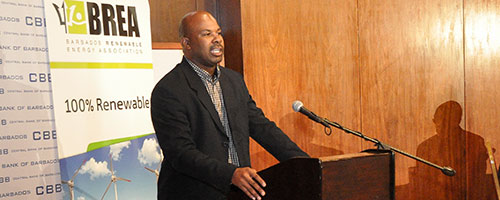The Barbados Renewable Energy Association (BREA) has agreed with a decision by the local regulator to deny Barbados Light & Power Co. Ltd permission to engage in fuel hedging.
President of the energy association Aidan Rogers said the Fair Trading Commission (FTC) was correct to rule against hedging given uncertainty about the impact on consumers.
“The case brought by the utility company did not adequately address the risks to consumers as far as higher prices are concerned. Crude oil prices have been extremely volatile this year and the Commission was correct in requiring several details associated with consumer protection,” Rogers, an attorney-at-law, remarked.
Companies seek to gain from hedging by locking in supplies at prices when they are low with the expectation they would rise and produce financial reward. In an ideal situation such gains would be passed on to the consuming public in the form or stable or lower prices.
Rogers said crude oil prices fluctuated from as low as 23.5 dollars a barrel in February to current prices of around 53 dollars. “Hedging is basically about timing and understanding markets to figure out the opportune time to jump in and invest,” he continued. “International developments quite often result in volatile price movements which is what we have seen in 2016,” the BREA president noted.
Barbados Light & Power Co Ltd applied to the Commission on March 29, 2016.
In its decision, the FTC determined that : (a) Due to the risks associated with fuel hedging BL&P should not be allowed to pass the cost of hedging and associated gains or losses onto the consumers of Barbados and (b) the Applicant had not provided sufficient evidence to suggest that the Barbadian public was willing to pay for the reduced volatility in fuel prices.
“The FTC decision is a sound one which we at the Barbados Renewable Energy Association support,” Rogers said.

